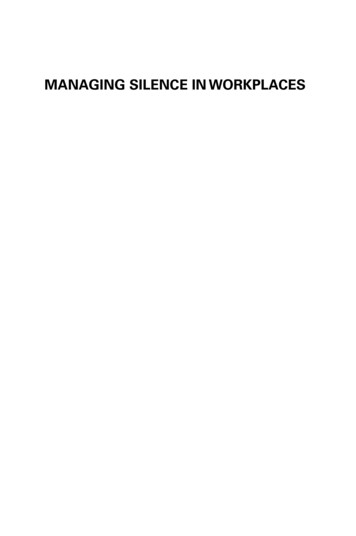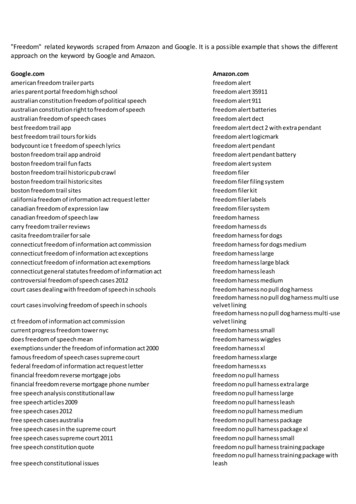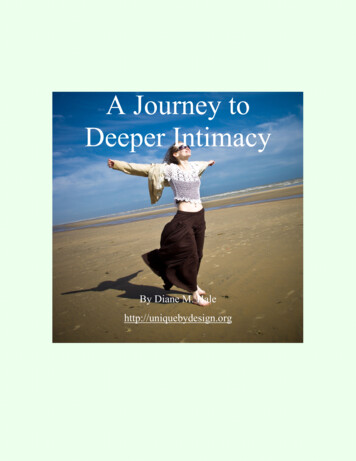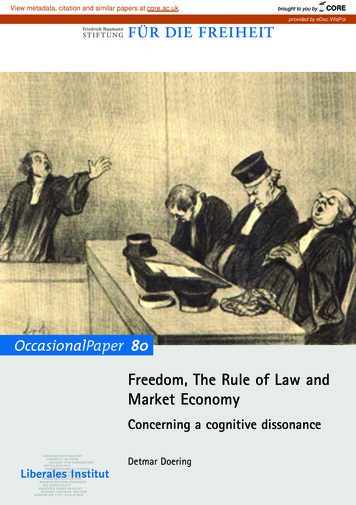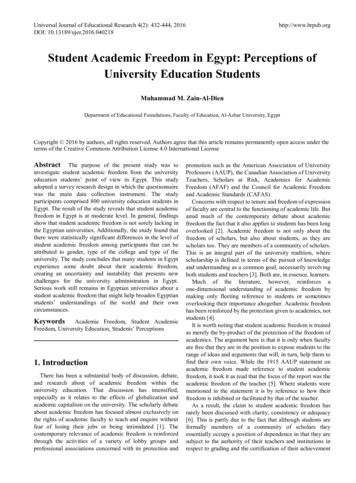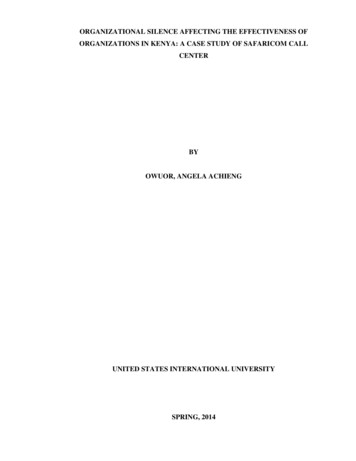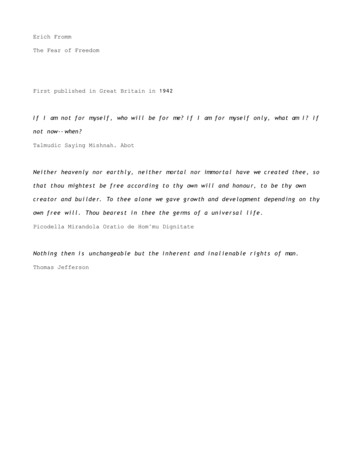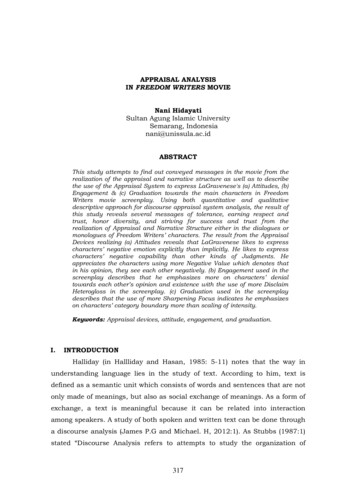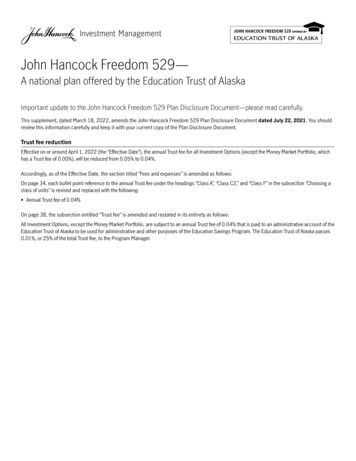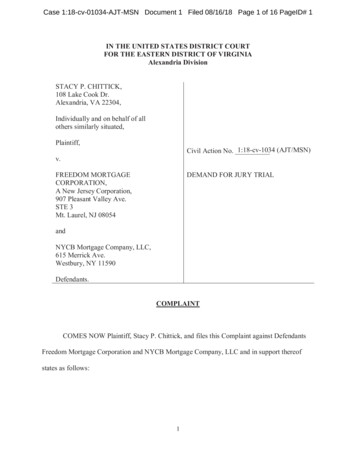
Transcription
A TOOL TO SILENCE:TORTURE TO CRUSH DISSENT INTHE DEMOCRATIC REPUBLIC OF CONGONovember 2018
DEMOCRATICREPUBLIC OFCONGO
FREEDOM FROM TORTUREFreedom from Torture is the only UK-based human rights organisation dedicated to thetreatment and rehabilitation of torture survivors. We offer services across England andScotland to around 1,000 torture survivors a year, including psychological and physicaltherapies, forensic documentation of torture, legal and welfare advice and creative projects.We are one of the world’s largest treatment centres, and since our establishment in 1985,more than 60,000 survivors of torture have been referred to us. Medico-legal reportsprepared by our expert clinicians are used as evidence in torture survivors’ claims forinternational protection, and form the basis of research reports such as this, aimed atholding torturing states to account.Through our Torture Accountability Programme, we work to expose torture in support ofefforts to strengthen prevention, secure justice and ensure international protection forsurvivors of torture. Survivor voices and expertise are at the heart of this work.We are the only human rights organisation that systematically uses evidence from our inhouse expert clinicians, and the torture survivors with whom we work, to work towards aworld free from torture.SURVIVORS SPEAK OUT NETWORKSurvivors Speak OUT (SSO) is the UK’s only torture survivor-led activist network and isactively engaged in speaking out against torture and about its impacts. Set up by and forsurvivors of torture, SSO uses first-hand experience to speak with authority for the rights oftorture survivors. The network is supported and facilitated by Freedom from Torture and allnetwork members are former Freedom from Torture clients.To find out more about Freedom from Torture and Survivors Speak OUT network please visitwww.freedomfromtorture.orgFollow us on Twitter @FreefromTorture and @SSOonlineOr join us on Facebook https//www.facebook.com/FreedomfromTorturei
I KNOWI KNOW HALF A LOAF IS BETTER THAN NOTHINGBUTSOMETIMES A WHOLE LOAF WOULD BE NICEI KNOW PEACE IS BETTER THAN WARBUTWHY THEN IS THERE WAR ALL OVER THE WORLD?I KNOW THINGS WILL NOT ALWAYS LOOK ROSYBUTIT WOULD BE GOOD IF THEY DIDI KNOW LIFE IS A JOURNEYBUTIT CAN BE TIRING, TO TRAVEL ALL THE TIMEI KNOW THAT HOPE LIKE A BLAZING CANDLE CAN BEPUT OUT IN A MOMENTBUTI ALSO KNOW THAT HOPE, LIKE CANDLELIGHTCAN LEAD THROUGH DARK MOMENTSI KNOW THINGS CAN FALL APARTBUTTHEY CAN ALSO COME TOGETHERI KNOW WE SHALL OVERCOME SOME DAYBUTIT WILL TAKE A LOT OF WORK TIM MALMOii
CONTENTSKey Points. 2Executive Summary. 3Survivor Voices. 8Introduction. 12Research methodology. 13Background. 16Long history of violence and torture. 16Beyond the Constitution: 2016 onwards. 17Torturing with impunity. 19Legal framework. 191. Who was detained and tortured, and why. 23Political and human rights activists.23Imputed political opinion.33Survivor profile.332. Detention context.38Arbitrary detention.38Violence at the point of arrest.39Detaining authorities.40Detention facilities.42End of detention.463. Evidence of Torture. 49Patterns of torture. 51Sexual torture.53Other torture methods.564. Impacts of torture. 67Physical impacts.74Psychological impacts.74Recommendations. 78To the President of the Democratic Republic of the Congo.78To the Government of the Democratic Republic of the Congo.78To the international community.79To the Government of the United Kingdom.79Survivor recommendations.81Appendix 1.82Appendix 2.85iii
TABLE OF FIGURESFigure 1: Timeline showing number of detentions, 74 people,all detentions.26Figure 2: Chart illustrating dates of detentions and context.28Figure 3: Choropleth map showing locations where people were detained.35Figure 4: Evidence of observance of due process.39Figure 5: Arrests by detaining authority, 74 people, where information onspecific authority was available.40Figure 6: Detentions by type of detention facility, 74 people, where informationon type of facility was available.42Figure 7: Named detention sites and responsible state authorities.43Figure 8: Incidence of rape and other physical torture in the case set.50Figure 9: Incidence of rape in the case set, disaggregated by sex.53Figure 10: Table showing physical evidence, by methods of torture disclosedin all detentions. 71Figure 11: Table showing most prevalent psychological symptoms (refer to Appendix 2 forincidence of all psychological symptoms).75Figure 12: Table showing range of psychological symptoms associated withsexual torture.76iv
ABBREVIATIONS AND ACRONYMS“African Commission’s Fair Trial Principles” – African Commission’s Principles andGuidelines on the Right to a Fair Trial and Legal Assistance in AfricaAMP – Alliance of the Presidential Majority (Alliance pour la majorité présidentielle)ANR – National Intelligence Agency (Agence Nationale de Renseignements)BDK – Bundu Dia Kongo, a political-religious group in the DRCDEMIAP – Military Detection of Antipatriotic Activities (Détection Militaire des Activités AntiPatrie), the former name by which DRC’s military intelligence organisation was knownDRC – Democratic Republic of CongoFARDC – Armed Forces of the DRC (Forces Armées de la République Démocratiquedu Congo)ICRC – International Committee of the Red Cross“Istanbul Protocol” – UN Manual on the Effective Investigation and Documentation ofTorture and other Cruel, Inhuman or Degrading Treatment or PunishmentMLC – Movement for the Liberation of Congo (Mouvement de Libération du Congo)MONUSCO – UN Organization Stabilization Mission in the Democratic Republic of theCongo (Mission de l’Organisation des Nations unies pour la stabilisation en Républiquedémocratique du Congo)“Mandela Rules” – UN Standard Minimum Rules for the Treatment of PrisonersPNC - Congolese National Police (Police Nationale Congolaise)PTSD – post-traumatic stress disorder“Robben Island Guidelines” – Robben Island Guidelines for the Prohibition and Preventionof Torture in AfricaUDPS – Union for Democracy and Social Progress (Union pour la Démocratie et leProgrès Social)1
KEY POINTSWomen and men who exercise their democratic and constitutionalright to engage in political and human rights activism are routinelydetained and tortured by state authorities in the DemocraticRepublic of Congo, in a context of political repression that isunrelated to armed conflict.Torture is used predominantly as a form of punishment forpolitical and human rights activism, and as a deterrent againstfuture involvement.Activists without high or public profiles are a target for repression.People are arbitrarily detained, and held in conditions that breachall accepted norms.Detainees are held without charge or any other of their due processrights in official and unofficial detention sites that operate undersystems of complete lawlessness.Torture, including rape, is endemic in the detention system,irrespective of the detaining authority or type of detention facility.Most of those who are detained, men and women alike, are raped,on multiple occasions and by multiple perpetrators. The rapes takeplace in a context of absolute impunity.Different branches of state security – police, military and intelligenceagencies – commit torture and other human rights violations fromthe point of arrest, and at both official and unofficial detention sites.There is no accountability or justice for survivors.2
EXECUTIVE SUMMARYThis report documents a situation of lawless and permitted horror in the DemocraticRepublic of Congo. Far removed from the context of conflict, political activists andthose perceived to have challenged the authorities are routinely detained and torturedwith impunity.None of those targeted for repression had a high profile. They are women and men whowere exercising their democratic rights and were tortured for engaging in lawful activities.Torture appears to have been used predominantly as a form of punishment for theirpolitical and human rights activism, but also as a deterrent against future involvement.METHODOLOGYOur research analyses 74 medico-legal reports prepared by and on behalf of Freedomfrom Torture between 2013 and 2018 for Congolese nationals who had fled to the UK.1They had been detained and tortured by state authorities in relation to their own or a familymember’s actual or perceived political or human rights activity.The report examines the profile of those tortured, the nature and circumstances oftheir arrest, the conditions of detention and torture they suffered, and the physical andpsychological impact of their treatment.This report was written in collaboration with the Survivors Speak OUT network andCongolese survivors through a series of workshops to provide survivor commentaryand recommendations.WHO WAS DETAINED AND TORTURED, AND WHY-- 49 women, 25 men;-- More than a third were 25 or under; five were legally minors when detained;-- Most were living in the Congolese capital, Kinshasa, far from the conflictaffected regions;-- More than half were detained more than once, and most were tortured every time.All were detained and tortured because of their own or others’ political or humanrights activity. This includes being a member or rank-and-file supporter of oppositionparties, campaigning organisations and pressure groups, and other types of civil societyorganisation. It encompasses a wide range of forms of public expression on issues suchas democracy and human rights, including women’s rights.3
Many people were involved in demonstrations and other protests connected with thedemocratic process and presidential elections, including those in 2006 and 2011 and thedelayed 2016 elections. Some were involved in activism as members or supporters ofpolitical opposition parties, especially the Union for Democracy and Social Progress (UDPS,Union pour la Démocratie et le Progrès Social) and other political pressure groups. For somepeople, a single activity resulted in detention and torture, such as wearing a T-shirt bearingthe name of a political opposition party or attending a single meeting or demonstration.Others were active on human rights issues, including civil and political rights, rights ofthe child and access to justice. Some supported particular civil society groups and nongovernment organisations, such as the pro-democracy and civil society movementFilimbi and the human rights organisation Voice of the Voiceless (Voix des sans Voix).Some worked directly with women and girls and campaigned on women’s rights issues,particularly related to sexual violence and rape.Others were detained either because of the actual or perceived activity of a family member,or because they were wrongly judged by the authorities to have been involved in political orhuman rights activity.DETENTION CONTEXTDifferent branches of state security – including police, military and intelligence agencies– were involved in the detentions from the point of arrest, at detention sites (official andunofficial) and in the perpetration of torture and other human rights violations. Our evidencedemonstrates appalling detention conditions in both official and unofficial sites that breachthe DRC’s obligations under instruments such as the UN Standard Minimum Rules for theTreatment of Prisoners and the African Commission’s Fair Trial Principles. It also revealsa complete absence of due process that allows torture to be carried out unchecked andwithout sanction.-- More than half were detained in violent circumstances, particularly those detained fromtheir home, or at a protest.-- All were held in arbitrary detention, in conditions that denied basic due process rights.-- Lack of sanitation, overcrowding and inadequate access to food and water werecommon in all detention facilities, breaching all international norms and standards.The majority of detentions took place at sites in and around Kinshasa, although elevenpeople were detained in sites in seven other provinces of the DRC. More than a quarterwere detained in prisons, and a similar proportion in unofficial or ad hoc detention sites,usually buildings in remote, isolated areas or hidden in scrubland or forest. The otherswere detained in police, military and intelligence facilities. A number of detention sitesare named. These include Makala Prison, Police Camp Lufungula and Camp Kokolo,all in Kinshasa.4
Most were in detention for less than six months during their most recent or only detention.The vast majority escaped, often with the assistance of a guard. Only four people said thedetaining authorities released them, in all cases without warning, explanation or formalprocess. Most of those who escaped said that a guard had offered help because herecognised or found an affinity with them, including common ethnicity or place of origin,or a family connection.More than three quarters fled the DRC within three months of getting out of detention.Some were told by the guards who helped them to escape that they should leaveimmediately or risk being killed.EVIDENCE OF TORTUREAll 74 survivors experienced physical and/or sexual torture at the hands of Congolese stateauthorities during their most recent detention episode. The methods reported include:-- beatings with various instruments;-- rape, including gang rape;-- burning with heated metal or cigarettes;-- positional torture, including suspension;-- sharp force trauma such as cutting, stabbing or biting;-- being forced to stare at the sun;-- partial asphyxiation; and-- electric shocks.Psychological torture was widespread. The most commonly cited methods were:-- verbal abuse and forced performance of humiliating acts;-- threats of death and of further torture; and-- witnessing torture and death of other detainees.More than half also described detention conditions that constitute a form of environmentaltorture, including the deprivation of normal sensory stimulation through prolonged solitaryconfinement in darkness.5
SEXUAL TORTUREThe case set shows an extremely high incidence of sexual torture. Women and mendescribe what appears to be an endemic and routine practice of rape in a wide range ofdetention facilities. Rape is carried out openly and with impunity by multiple perpetrators.Sixty-five women and men disclosed sexual torture, all but two of whom were raped –vaginally, anally and/or orally – at least once. This represents 85% of all cases - 94% of thewomen and 68% of the men. More than half of those who were raped described episodesof gang-rape. Given the difficulties many survivors have in disclosing rape, the real figuremay be higher. The violent, sustained and repeated nature of sexual assaults resulted inprofound physical and psychological injury.IMPACTS OF TORTUREAll survivors were found to have enduring psychological symptoms linked to their torture,with many specifically linked to their sexual torture.The aggregation of findings cannot convey the uniqueness of each person’s history,experience of detention, combination of torture methods used and the devastating shortand long-term physical and psychological impact. However, they do demonstrate extensiveand systemic use of torture in the DRC.FLAGRANT DISREGARD FOR THE LAWThe Government of the Democratic Republic of Congo has signed up to international andregional treaties that protect a wide range of human rights. The national constitutionupholds the absolute ban on torture. Despite this, the widespread practice of tortureand the flagrant violation of civil and political rights continue without any recourse to justicefor victims or accountability for senior security personnel or government officials who allowthese violations to take place. In short: the government is not only failing to prevent torture,it is tacitly or actively condoning torture. Moreover, it is failing to provide accountabilityfor survivors.The patterns and practices highlighted are deeply concerning, particularly as thecountry prepares for controversial and long-delayed elections scheduled for December2018. People engaged in legitimate political expression are at risk of arbitrary arrest,torture and death unless the Government of the DRC significantly changes its behaviour.6
RECOMMENDATIONSFreedom from Torture is calling on the government of the Democratic Republic of Congo to:1. Immediately end the practice of torture and ill-treatment and undertake prompt,thorough and impartial investigations into all allegations of such treatment, as well asensuring that alleged perpetrators of and accomplices to torture are brought to justice.2. Commit to eradicating the prevalence of sexual torture in all contexts by ensuring thatperpetrators are brought to justice, irrespective of rank or position, and that safeguardsexist in detention settings.3. Ensure that detention conditions comply with the revised 2015 UN Standard MinimumRules for the Treatment of Prisoners (the Mandela Rules) and immediately close allunofficial detention sites.Freedom from Torture is calling on the international community to:1. Send a strong signal to the Government of the DRC that any form of torture or illtreatment in the lead-up to, during and after the December 2018 elections will not betolerated and will be condemned in the strongest possible terms.2. Ensure that concerns about human rights abuses, including torture, are raised in allbilateral and multilateral discussions on human rights with the Government of the DRCand encourage it to fulfil its obligations under international human rights standards andthe 2005 Constitution.3. Immediately cease forced returns of Congolese nationals to the DRC in line with theinternational obligation of non-refoulement (non-return).2Election observation missions for the December 2018 elections should:1. Publicly condemn any torture and ill-treatment that is reported during the upcomingelection period.2. Ensure that any allegation of torture and ill-treatment is promptly and thoroughlyinvestigated and documented both by the Government of the DRC and electionobserver missions.7
SURVIVOR VOICESThe voices of survivors are central to the advocacy of Freedom from Torture to preventtorture and secure justice. In preparation for this report, we conducted focus groups andindividual discussions with 30 Congolese torture survivors to discuss accountability fortorture in the Democratic Republic of Congo (DRC) and what they would like to see as ouradvocacy priorities.The 30 survivors, 17 men and 13 women, are either current or former therapy clients atFreedom from Torture. The discussions took place over several weeks and across Freedomfrom Torture centres in the UK. Most conversations were facilitated and led by SurvivorsSpeak OUT, an activist network set up and run by and for former treatment clients ofFreedom from Torture to speak out against torture and its impact. Through this report,survivors demand justice for themselves and other survivors of human rights violationsand to stand up against the torturers who sought to silence their voices for all time.“A TOOL TO SILENCE”“Even though you see something bad you can’t say.You are scared because tomorrow you will disappear.”Congolese torture survivorThese words of one survivor reflect a point that all groups made – that the authoritiesuse torture as “a punishment” to try to silence people. They seek to make the cost of civicinvolvement so high and try to instil such profound fear that no one will dare to speakout about violations in the country. One participant spoke of how university students aretargeted for being a potential driving force for protest and change. “We get to the pointwhere young people don’t have heart any more”.Participants said that family members were targeted to silence activists:“Knowing that they cannot touch me directly they might start targeting members of myfamily, just to silence me. Because I know that if I carry on, it might mean losing my family.It might mean losing my children.”That fear extended to survivors who took part in the discussions in the relative safety of theUnited Kingdom, and even in a context of anonymity. Several said that their families wouldbe at risk if it was known that they were participating in such a process. They said thatsome survivors had chosen not to attend because of the perceived risks.3 Those who didchoose to participate said that they did so, despite what they saw as the risks, because ofa commitment to contribute to a process that might improve the situation for people in theirhome country and ensure no one else would have to suffer what they endured.8“ We are thewitnesses;we arethe victimsof theseabuses.”Congolese torturesurvivor
“A WAY OF LIFE”Participants said that torture is commonplace in the DRC – “a way of life” – even thoughthe country is supposed to be a democracy and bans torture. Described as a “system”,they reported that torture is used by:-- state agents to punish politically-involved people and human rights defenders;-- police as a common interrogation technique in criminal matters; and-- prominent and politically-connected individuals in personal or business disputes.In particular, they said sexual torture was so common that it was “seen as normal”. In thewords of one woman, “No one goes to prison for rape any more.”Participants also spoke of security forces assaulting people in public as standard practice.“WHEN IT IS ELECTIONS, INNOCENT PEOPLE DIE”Another dominant theme in the focus group sessions was fear and a sense ofhopelessness around the upcoming elections. None of the participants felt that theDecember 2018 elections were likely to be free and fair. “There will be no change”was a widely expressed view. One participant said:“ Humanrights areonly for thosein power we, thecitizens,do not havehumanrights.”Congolese torturesurvivor“The truth is that the Congolese people have never chosen a president up to now.From 1960, the president that is chosen by the Congolese people is not the one who isleading the country.”Many participants expressed fear. One said:“So now we are even scared as the election is approaching and know that we only havetwo options – either killing or fights. Literally killings and fights.”“CONGO: THE PLATE EVERYONE COMES TO EAT FROM”“DRC is one of the richest countries in the world but Congo does notbelong to the people, the Congolese people. Every country in the worldsupports [the President] because they take the riches [from] the country.Not just governments but also companies .”Congolese torture survivorParticipants repeatedly spoke of what they saw as the complicity of international actors– both governments and corporations – in maintaining a system of governance that iswidely seen as ruthless and oppressive. They felt that the international community wasnot interested in effectively challenging human rights violations because of the economicbenefits of supporting a corrupt government. Many noted that the exploitation of thecountry’s natural resources had been going on since colonial times and argued that onlythose who had “set up the system” had the power to dismantle it.9
We heard numerous pleas to the international community (governments andbusinesses) to:-- be honest and fair;-- support the development of strong institutions to control resources;-- stop supporting “big men”; and-- understand that there is enough wealth in the country to share with everyone –Congolese and others.One participant said:“We just want a fair deal. They can’t be buying our natural resources and think we don’t seehow they are exploiting us. We want a fair deal, a fair trade. That is all we want. Simple.”Another called on all individuals to speak out about the violations in the DRC, including withreference to minerals such as coltan and cobalt, used in mobile phones:“Everyone has Congo in their pocket. Everyone has a smartphone. Everyone needs to standup and say something about change in that country, because if you have a phone or TV,you have part of Congo in your house.”“SENDING US BACK TO DIE”“They know what is going on in our country but they still don’t believe usand they are sending people back and they are dying.”Congolese torture survivorParticipants in the discussions spoke of the difficulties they experienced when trying to claimasylum in other countries, including the United Kingdom. They felt that decision-makerswere aware of the human rights violations taking place but that asylum decisions did notreflect this knowledge. Participants voiced anguish at the forced return of Congolese peopleto what they see as a violent and oppressive system.10“ We just wanta fair deal.”Congolese torturesurvivor
They believed that the Government views people in the diaspora as having “betrayed”the country by talking about what is happening in the DRC. They said that the governmentviews anyone returning, either voluntarily or not, as a “high-level opponent”. They fearedpeople would be treated “without mercy” on return and probably imprisoned.“NEW FACES”All the 30 survivors in our focus groups said that torture is rampant and is condoned andencouraged from the very highest echelons of government. They said they wanted justicefor the torture that they and others had endured. For them, this meant prosecuting seniorgovernment officials. They appealed for support in their efforts to bring democracy, justiceand accountability to the country.Freedom from Torture will continue to work with these groups to develop advocacy activitiesthat call for greater recognition of torture patterns in the DRC and for those responsible tobe held to account.“ We need yourhe
Freedom from Torture is the only UK-based human rights organisation dedicated to the . is endemic in the detention system, irrespective of the detaining authority or type of detention facility. Most of those who are detained, men and women alike, are raped, . Filimbi and the human rights organisation Voice of the Voiceless .
